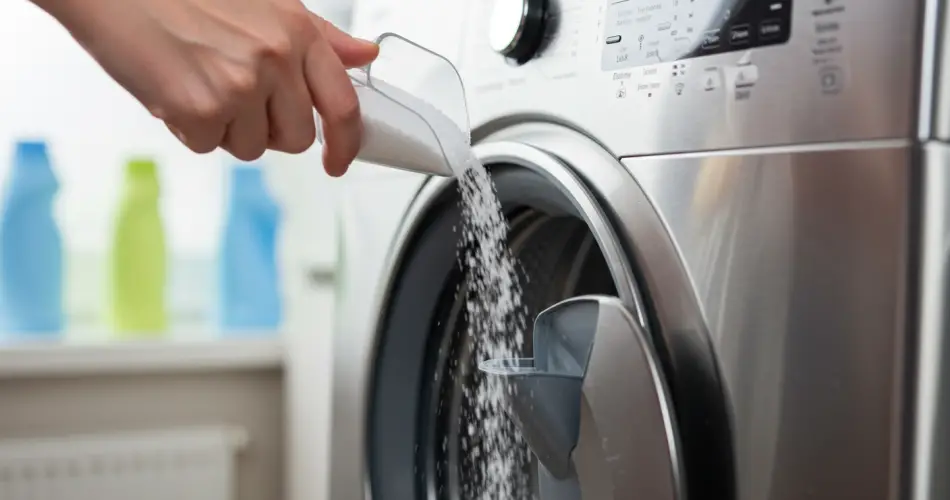Household appliances like washing machines are indispensable, but many people overlook the importance of regular maintenance. A washing machine that appears to function normally can accumulate limescale, soap residue, and bacteria over time. These deposits not only affect the performance of the machine but can also increase energy consumption, ultimately inflating your electricity bills. Fortunately, with a simple and natural solution, you can keep your washing machine clean, efficient, and reduce monthly utility costs.
Why Washing Machine Maintenance Is Essential
Even though the washing machine’s primary purpose is to clean your clothes, it itself requires regular cleaning. Over time, minerals in the water can create limescale, particularly in areas with hard water. Limescale buildup can damage internal components, reduce washing efficiency, and cause unpleasant odors in your laundry.
A clean washing machine operates more efficiently, uses less water and electricity, and ensures that your clothes come out fresh and hygienic. Regular maintenance prevents costly repairs and extends the lifespan of your appliance.
The Power of One Spoonful
Surprisingly, a small amount of a common household ingredient can make a significant difference. By adding just one spoonful of a natural cleaning agent to the drum before running a hot, empty wash, you can dissolve limescale, eliminate odors, and improve energy efficiency.
Natural Cleaning Agents for Your Washing Machine
-
White Vinegar
White vinegar is a versatile, natural cleaning agent that has long been used for household purposes beyond the kitchen. It is antibacterial, disinfectant, and mildly acidic, making it highly effective against limescale and soap scum.
-
How to use: Pour a few tablespoons of white vinegar directly into the washing machine drum. Run an empty wash cycle at the highest temperature setting. This will clean the interior thoroughly, removing deposits and leaving the machine odor-free.
Vinegar not only helps with limescale but also acts as a natural fabric softener, reducing detergent residue on clothes. Using vinegar regularly can ensure your washing machine functions efficiently, helping reduce energy consumption and lowering your electricity bill.
-
Baking Soda
Baking soda is another household staple with multiple cleaning benefits. Its slightly alkaline nature helps break down grease, neutralize odors, and prevent limescale buildup.
-
How to use: Add a few tablespoons of baking soda to the drum and run an empty, high-temperature cycle. This method is particularly effective if your machine has accumulated detergent residue or unpleasant smells.
Baking soda also enhances the cleaning power of the next laundry load, helping clothes feel fresher while keeping your washing machine in top condition.
-
Citric Acid
Citric acid is a potent natural descaler and disinfectant. It combats mold and limescale effectively and helps maintain the washing machine’s overall hygiene.
-
How to use: Dissolve about 150 grams of citric acid in 1 liter of water and pour it into the drum. Run a hot, empty wash cycle. Citric acid not only removes limescale but also acts as an antioxidant, keeping your washing machine parts in better condition over time.
-
Rock Salt (Salgemma)
A traditional remedy, rock salt has been used for decades to remove unpleasant odors and prevent limescale accumulation.
-
How to use: Add a few tablespoons of rock salt directly to the drum and run a hot wash cycle. This old-fashioned solution is simple, inexpensive, and highly effective.
Benefits of Using Natural Cleaning Agents
Using natural products in your washing machine offers several advantages:
-
Energy savings: A limescale-free machine works more efficiently, reducing electricity consumption. Many households report up to a 50% reduction in energy costs by maintaining their washing machine regularly.
-
Longer appliance lifespan: Regular cleaning prevents corrosion and damage caused by mineral buildup, reducing the risk of expensive repairs.
-
Hygienic laundry: Bacteria, mold, and soap residue are removed, leaving clothes fresher and cleaner.
-
Environmentally friendly: Using natural cleaning agents like vinegar, baking soda, and citric acid reduces the need for chemical-based descalers, which can be harmful to the environment.
-
Cost-effective: These solutions are inexpensive and readily available in most homes, eliminating the need for specialized, costly cleaning products.
Tips for Effective Washing Machine Maintenance
-
Regular cleaning: Run an empty hot cycle with a cleaning agent once a month or every 4-6 weeks, depending on usage and water hardness.
-
Leave the door open: After each wash, leave the washing machine door slightly open to prevent moisture buildup and mold growth.
-
Clean the detergent drawer and filter: Residue often accumulates in these areas, contributing to odor and reduced efficiency.
-
Avoid overloading: Overloading increases strain on the motor and reduces cleaning efficiency.
-
Check water hardness: In areas with very hard water, consider using a water softener to minimize limescale buildup.
Conclusion
Maintaining a washing machine doesn’t require expensive products or complicated procedures. By adding just a spoonful of natural cleaning agents such as vinegar, baking soda, citric acid, or rock salt to the drum before an empty hot wash, you can prevent limescale buildup, remove odors, and ensure your appliance runs efficiently.
Regular maintenance improves laundry hygiene, extends the life of your washing machine, and can lead to significant energy savings. In many cases, keeping your washing machine clean can help cut your electricity bill in half, making this simple routine both practical and cost-effective.
With these natural and accessible solutions, you can keep your washing machine performing at its best, save money, and reduce the use of harsh chemicals in your home—all with just a spoonful of household ingredients.



